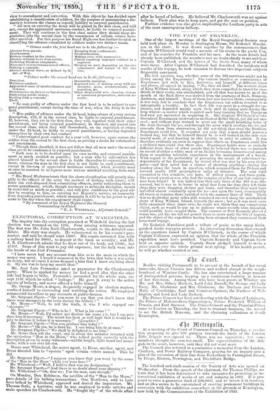THE FATE OF FRANKLIN.
One of the largest meetings of the Royal Geographical Sooiety ever held took place on Monday in Burlington House, Sir Roderick Murchi- son in the chair. It was drawn together by the announcement that Captain M'Clintock would read a memoir of his cruise in the yacht Fox, and of his searches for Franklin and his men. As the main details had already been published, the members met no doubt chiefly to see and hear Captain M'Clintock and the heroes of the Arctic Seas, many of whom were there. After Captain M'Clintock had described the incidents and results of his voyage, he took occasion to discuss two important subjects frequently canvassed. The first question was, whether some of the 105 survivors might not be living among the Esquituaux. ? The various families or communities of Esquimaux met with by Rae, Anderson, and himself, at different times and places, all agreed in saying, "No, they all died." The western shore of King William bland, along which they were compelled to travel for two- thirds of their route, was uninhabited, and all that was known to us of the mouth of the Back River was derived from the journeys of Back, Simpson, Anderson, and himself. None of them had met natives there, consequently it was very fair to conclude that the Esquimaux but seldom resorted to so inhospitable a locality. In fart their life was spent in a struggle for ex- istence, and depended mainly upon their skill in taking seals during the long winter—a matter which required such long training that no European had ever yet succeeded in acquiring it. His (Captain M'Clintock's) two Greenland Esquimaux tried various methods at Bellot Strait, yet did not suc- ceed; and without dogs trained to scent out the small breathing holes of the seals through the ice, and through the snow which overlays the ice and conceals them from observation, he did not think that even the Boothian Esquimaux could live. It required not only that a man should possess a trained dog, but that he himself should be so well trained in the only suc- cessful mode of seal-hunting in this locality in order to subsist. It was therefore evidently an error to suppose that where an Esquimaux could live a civilized man could live there also. Esquimaux habits were so entirely different from those of other people that he believed there was no instance on record of either a white man or an Indian becoming domesticated among them or acquiring tolerable expertness in the management of a kayak. With regard to the probability of procuring the means of subsistence in- dependently of the Esquimaux, he stated what was shot by his own sledge party—and they never lost a chance of shooting anything—during the journey along the lands in question, which occupied them for 79 days and covered nearly 1000 geographical miles of distance. The sum total amounted to two reindeer, one hare, 17 willow grouse, and three gulls. The second question was, why had the remains of so few of our lost country- men been found ? It was indeed true that only three of the 105 were dis- covered, but it was to be borne in mind that from the time they left their ships they were dragging sledges and boats, and therefore they must have travelled almost constantly upon the ice—not upon the land, consequently all traces or remains there vanished with the summer thaw of 1848. There was no doubt that many relics still remained strewed along the uninhabited shore of King William Island, beneath the snow ; but as it was most care- fully examined three times over, he could not think that any conspicuous object, such as would be put up to indicate where records were deposited, could possibly have escaped them. The summer at Port Kennedy proved a warm one, yet the ice did not permit them to move until the 9th of August, and the object of the expedition having been attained they commenced their homeward voyage.
Sir Roderick Murchison paid a tribute of praise to the many distin guished Arctic voyagers present. An interesting discussion then ensued on the questions raised by Captain M'Clintock, in the course of which Captain Collinson expressed an opinion that the whole of the Franklin expedition must have perished. Captain Kennedy and Captain Snow held an opposite opinion. Captain Snow pledged himself to make a strict search over the whole ground next spring. If his health permit, he will go whether assisted or not.


























 Previous page
Previous page